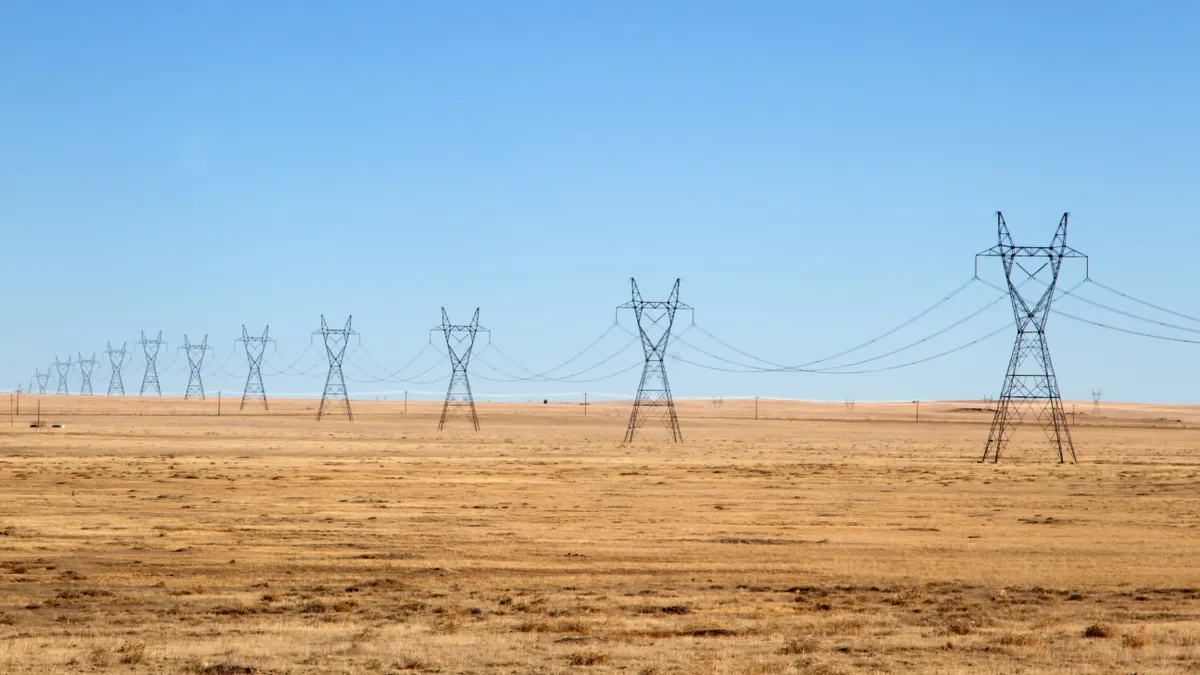Dive Brief:
- Colorado regulators on Wednesday gave verbal approval to parts of Xcel Energy’s $15 billion Clean Energy Plan, but chose to delay some projects and about $3 billion in transmission construction over cost and deliverability concerns.
- Xcel’s preferred portfolio included more than 7 GW of mostly wind, solar and storage, with some gas generation. Regulators approved about 5,800 MW of the resources, and acknowledged the remainder will likely be needed at a future date. PUC Chairman Eric Blank called it a “cautious, no regrets, alternative approach.”
- But environmental groups say the commission should have gone ahead and approved Xcel’s full suite of renewable resources. “We're better off investing in renewable energy now, especially with available federal incentives,” Ren Smith, an organizer with the Colorado Sierra Club, said in a statement.
Dive Insight:
Colorado regulators removed more than 2 GW of wind and solar from Xcel’s plan, but said those resources may eventually be approved.
“I think we're ultimately going to need all the wind and solar, as well as the storage and new transmission ... that is in the preferred plan,” Blank said. “However, I think that delaying approval of some of the new generation ... provides some real benefits.”
The alternative plan Colorado regulators approved includes 5,835 MW of new resources compared with almost 7,200 MW in the preferred portfolio. The alternative plan also reduces the share of new generation that Xcel would own, from roughly two-thirds to about 50-50.
Delaying some of the new generation will allow regulators “to better understand the cost, value, timing and need for the new transmission before we're committed to building it,” Blank said. “If we approve all the generation that's in the preferred plan, I'm concerned that we may be obligated to the new transmission no matter what the costs.”
Xcel had proposed 3,406 MW of wind generation but got approval for 1,700 MW. The utility’s solar proposal of 1,969 MW was trimmed to 1,619 MW. Approved storage resources were 1,848 MW, compared with the utility’s preferred portfolio of 1,170 MW.
A spokesperson for Xcel said the utility “appreciate[s] the discussion at the Commission and its verbal approval,” but noted that its preferred plan would have done more to reduce greenhouse gas emissions.
“While the approved plan increases renewable energy to 77% of our energy portfolio by 2030, our updated preferred plan offers greater benefits for customers,” the utility said. The preferred plan would have renewables at 83% of Xcel’s energy portfolio by 2030, “capturing more federal tax dollars, reducing more carbon emissions over time and is better for our union coworkers,” the utility said.
Colorado regulators also gave verbal approval to 669 MW of gas generation, compared with the 628 MW Xcel included in its preferred portfolio.
"The PUC’s shortsighted decision is bad for customers, the environment, and workers because it will ultimately drive up costs and delay Colorado's green energy transition," said Alana Miller, Colorado climate policy director for the Natural Resources Defense Council. "Somehow they've settled on a decision that unnecessarily increases emissions while stifling renewable energy opportunities for Colorado’s economy, all while not actually saving money for customers in the long run.”
Colorado regulators said they trimmed renewable generation in part over deliverability concerns.
“I see little rationale for essentially front loading investment in more resources than it appears the grid can or will be able to handle,” Commissioner Megan Gilman said at Wednesday’s meeting.
“I would love to sit here today and support the option that on paper gives the highest greenhouse gas reductions. But I think there are very significant doubts those greenhouse gas reductions are what we actually get, especially in the short term, when we're seeing really high levels of curtailment,” Gilman said.
According to the Sierra Club, the approved portfolio is 23% more expensive than Xcel's preferred portfolio on a dollar-per-megawatt basis.
“The PUC claimed to be pursuing a ‘no regrets’ policy, but chose more gas, and far less renewables, delaying Xcel's needed acquisition of more renewable energy, which could be more costly than locking in investments now,” the group said.















